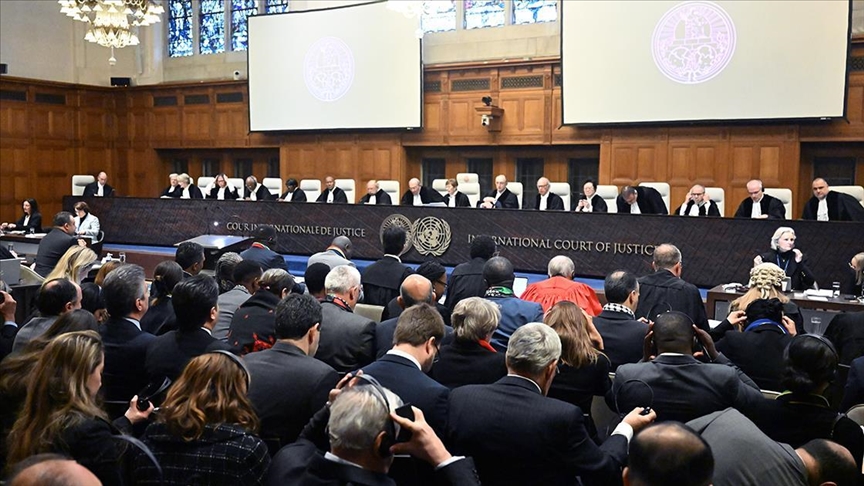

By Anadolu Agency
ISTANBUL
Last week’s legal battle at the International Court of Justice (ICJ) between South Africa and Israel over genocide allegations in Gaza has triggered a wave of reactions, highlighting the deepening divisions on the international stage.
At The Hague hearings, South Africa’s legal team laid out in detail its charges against Israel, covering five main “genocidal acts” – the mass killing of Palestinians, infliction of serious mental and bodily harm, forced displacement and blockade on essential supplies, complete destruction of Gaza’s healthcare system, and preventing births in Gaza by blocking life-saving medical treatment and aid.
Israel’s response was centered on its right to self-defense against Hamas, denying that it has “genocidal intent,” asserting it has been trying to “minimize” civilian harm, and questioning the ICJ’s jurisdiction to handle the case.
Divisions on the global front became all the more evident once the hearings wrapped up, with countries from the Global South, particularly African, Latin American and Muslim-majority nations rallying behind South Africa.
On the other hand, the Global North, led by Western powers like the US, Canada and Germany, remains firm in supporting Israel.
Despite the backing of its usual allies, experts suggest the ICJ case could be a harbinger of increased international isolation for Israel, and stronger support and solidarity for the Palestinian cause.
Zeidon Alkinani, a political analyst focusing on the Middle Eastern region, views the ICJ’s involvement as a significant breakthrough, emphasizing how international institutions had failed to address Israel’s violations against Palestinians for years.
“The ICJ case is a major milestone in international accountability of Israeli violations of international law, through its illegal settlements and ethnic cleansing of Palestine, given that international institutions failed to put a limit for decades,” Alkinani, a non-resident fellow at Arab Center Washington DC, told Anadolu.
“The October 2023 attacks and the consequential genocide committed in Gaza was believed to be determinant chapter in the modern history of the Israeli occupation of Palestine, and ICJ’s case is one of its outcomes.”
Regardless of the outcome, this is a “major development in addressing Israeli apartheid,” he said.
“South Africa’s lead on this also reflects that the Palestinians no longer need to be concerned about the rise of normalization led by certain Arab states,” he said.
“The Palestinian issue may have been failed by a regional support but is now benefiting from an international support.”
Elaborating, he said South Africa’s leading role in the case “ideologically and culturally transforms the Palestinian issue from a regional one to an international issue.”
This also counters the “Palestinian disappointment towards the rise of Arab state normalization wave with Israel in recent years,” he said.
South Africa, formerly colonized by a European apartheid is well aware of what Palestinians are going through, hence it took this case to The Hague, Alkinani added.
Consequences for Israel
Political analyst Ali Bakir believes that an ICJ ruling against Israel could “unleash a cascade of far-reaching consequences, extending well beyond mere legal ramifications.”
“Such a decision would not only be a blow to Israel’s legal standing but would also deeply impact its political, economic, and military spheres,” he told Anadolu.
Bakir, a professor of international affairs at Qatar University, warned that an adverse judgment could even jeopardize the position of Prime Minister Benjamin Netanyahu and his ruling government.
“The political landscape within Israel would likely undergo seismic shifts. Prime Minister Netanyahu’s tenure could be brought to an end, leading to an urgent call for his replacement,” he said.
Bakir, who is also a non-resident senior fellow at the Atlantic Council, clarified that this is not just about one leader’s fate but a reflection of a country grappling with the weight of international scrutiny, and “would profoundly affect Israel’s future actions.”
“It cannot simply proceed as before; doing so would risk cementing a global perception of an intent to commit acts of severe injustice against the Palestinian people that amount to genocide,” he emphasized.
The expert also believes that the ICJ ruling would not just be an “endpoint,” but rather “a potent tool that could be leveraged in various international platforms.”
“It could serve as a basis for pursuing legal actions against Israeli officials and military commanders, further entangling Israel in a web of international legal challenges,” said Bakir.
Alkinani agreed with this assessment, saying that the case will certainly decrease Israel’s international support, although the exact degree of its impact remains unclear.
Impact on allies
Analysts are also of the view that the ICJ case and its ruling against Israel would have “perhaps one of the most consequential effects” on its standing among allies.
“Nations like the US, Germany and UK, which have traditionally supported Israel, may find themselves in an increasingly untenable position,” said Bakir.
Continuing their support in the face of an adverse legal decision becomes “a complex, perhaps impossible, task, especially if the ruling considers them complicit with the Israeli crimes,” he added.
“This, in turn, could lead to Israel’s deepening isolation on the world stage. The few countries that continue to voice support might find themselves under immense pressure, their diplomatic stance becoming increasingly difficult to justify,” he said.
According to Alkinani, if South Africa’s case fails to hold Israel accountable through the ICJ, then the UN and international institutions would have failed the “last bit of hope that was left for the international community to finally solve this issue.”
We use cookies on our website to give you a better experience, improve performance, and for analytics. For more information, please see our Cookie Policy By clicking “Accept” you agree to our use of cookies.
Read More